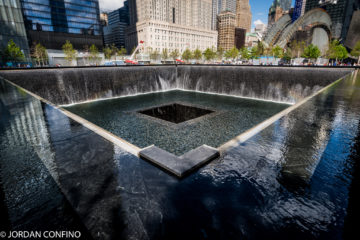Soundtrack in my head: Prince and the Revolution: Mountains
Congresswoman and Presidential candidate Tulsi Gabbard (D-HI) has been willing to say what very few politicians have said about the terrorist attacks on September 11, 2001. Tulsi Gabbard’s positions on 9/11 mostly match what I’ve been saying for years. But I have some real questions about the implications of what she’s saying. Hopefully, she’ll clarify her position as her campaign continues.
In the video above, she references all of the “wasteful regime change wars” we’ve engaged in since 9/11. She says that these wars have only made the national security of the United States worse. In a blog post from 2006, I pointed out that for the first time, fifty people holding a significant grudge against the US could now bring the most powerful country in the world to it’s knees. I said that this fundamentally changes the nature of war from here on in. But, by continuing to fight these wars, the US government is fighting a 21s century war with 19th and 20th century means. I said that every bomb dropped plants the seed for a potential new terrorist attack.
In a blog post from 2012 I pointed out about how the previously “secret” drone strikes the US was engaging was also making things worse. I demanded that the US “stop pouring gasoline on the fire” by engaging in such folly. By that point, our so-called War On Terrorism had expanded to Libya and Somalia. And I said in one of my last blog posts from 2014 that extending the war to Syria to fight ISIS was going to be useless. I called it a fruitless game of “worldwide whac-a-mole” to combat a problem we ourselves created. It is true that many people are better off now that ISIS has essentially no territory. But then again, their ultimate defeat proves evasive.
Tulsi sees that these wars are wasteful. I haven’t yet heard what she thinks of the drone strikes. I would imagine she wouldn’t approve of the massive civilian casualties that these strikes have caused.

Tulsi is fourteen years younger than me and was twenty during the time of the 9/11 attacks. She responded to the attacks by volunteering for the Hawaii National Guard, and later served two tours of duty in Iraq. She saw firsthand the wasteful nature of these wars and the horrible toll they had on military families. But she sees the 9/11 attacks as attacks, and that we are at war with the attackers. In an interview with Wolf Blitzer from 2015, she criticized President Obama for refusing to admit “who our enemy is,” saying that the enemy is “radical Islam.”
With that last statement, she’s only partially right.How does she define radical Islam? Would the government of Saudi Arabia, for example, fall under her definition of radical Islam? Would she include all strands of Islam that identify themselves with the Salafi movement. They are fundamentalist to the extent that they look back to the first three generations of Muslims, who they see as “pure.” (Note the similarity between the identification with early Muslims and Christan fundamentalist identification with the early Christians.) What does she feel about the Wahhabi Movement that the Saudi government is closely allied with? There are allegations that some Saudi officials collaborated with the hijackers in preparation for 9/11, and 15 of the 19 hijackers were themselves Saudi.
I don’t think radical Islam as a whole is a threat to the United States. If the West wasn’t so heavily enmeshed with the Middle East, radical Islam wouldn’t really care one whit about the US and Europe. It needs to be pointed out that the US supported many of these Islamic radicals in their efforts to drive the Soviets out of Afghanistan. But when the US got involved in the Gulf War and stationed troops in Saudi Arabia, Al-Qaeda and others considered the stationing of foreign Western troops on Saudi soil to be unacceptable.
Tulsi is correct to point out in her interview with Wolf Blitzer that we need to understand those who oppose us. I hope that in understanding the “radical Islamic agenda”, (as well as clearly defining it) she also understands the legacy of Western colonialism. After all, the Salafi movement that developed in the late 19th century in Egypt was a response to Western colonialism. The 9/11 attacks should have been a a time for us to re-evaluate US foreign policy, because it is our foreign policy that created these conditions. We need to look at the Western legacy of colonialism, and the impact that it has had on the well-being of people in the Middle East.
Beyond that, she needs to articulate how we can win a “War on Terrorism.” Like I said, given that 50 people holding a grudge against the US can inflict such incredible damage on a nation means that old notions of national security have been thrown out the window. Our national security is not going to be protected by having TSA make us take off our shoes at airports. A new definition of national security needs to take into consideration the well-being of the rest of the world. I think Tulsi does get this. She recognize that the US can’t be the world’s police force. She has said that she will do whatever it takes to fight for peace.
Clearly she’s not a pacifist, nor should she be. She is right to condemn the regime change wars we’ve been in, and I’m astounded in her ability to promote that. But if she believes we need to defeat radical Islam, she needs to define more clearly who she sees as the enemy and what victory would look like.
